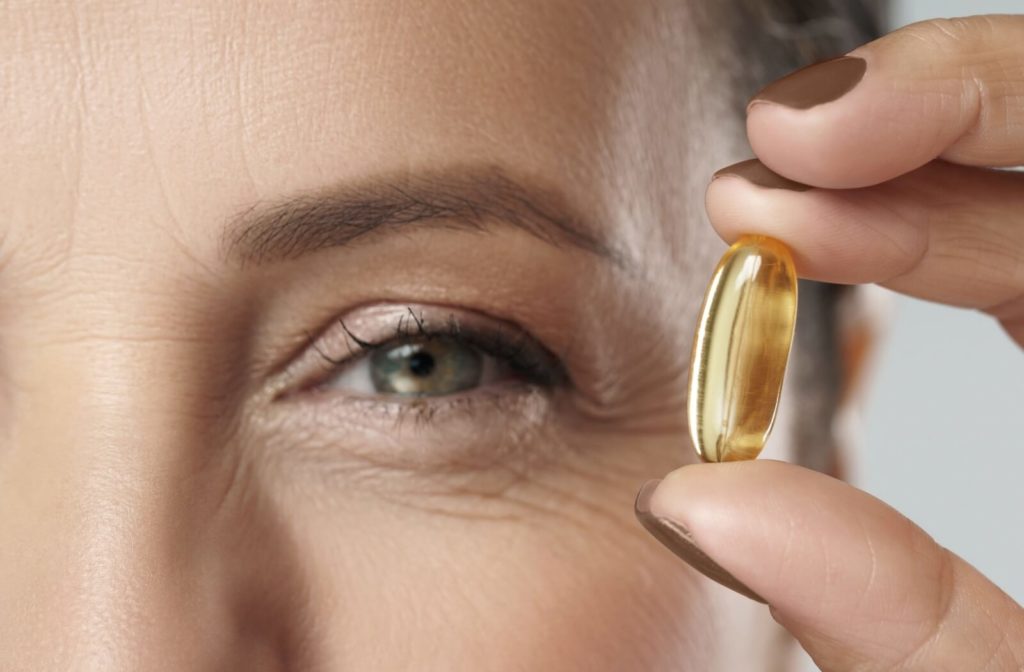Dry eyes are more than just a minor annoyance. For many, they are a chronic condition that can impact quality of life, causing discomfort and sensitivity to light, even affecting vision. Fortunately, nutrition has a role to play in mitigating the symptoms of dry eyes.
Before your next eye exam, you may have questions about supplements that can assist with dry eyes. Some supplements that can relieve dry eyes include omega-3 fatty acids, vitamin A, gamma-linolenic acid, and vitamin D.
Keep reading to learn more about the best supplements to support eye health and hydration.
Understanding Dry Eyes
Before we examine the supplements that can help dry eye, it’s crucial to understand what the condition entails. Technically referred to as dry eye syndrome or evaporative dry eye, dry eyes occur when your tear film evaporates too quickly due to a reduced oil layer in the tear film.There is also a more severe form of dry eye called keratoconjunctivitis sicca where there is not enough of the watery portion of the tear film being produced. This is usually related to autoimmune diseases like Sjogren’s syndrome.
Evaporative dry eye is due to reduced oil secretion of the meibomian glands, called meibomian gland dysfunction. Healthy meibomian glands produce a clear oil that prevents the tear film from evaporating between blinks. With age the glands become clogged and inflamed causing the secretions thicken producing an unstable tear film. Fortunately certain dietary supplements can help reverse this process.
The condition can affect anyone, but it’s more common in people over 50, contact lens wearers, and those with certain medical conditions such as diabetes, thyroid disorders, or autoimmune diseases. Symptoms of dry eyes include:
- Stinging or burning sensation
- Redness
- Excessive tearing
- Sensitivity to light
- Blurred vision/fluctuating vision
The Role of Supplements in Eye Health
The modern diet often lacks key nutrients essential for maintaining overall health, including eye health. Supplements can fill these gaps, providing necessary components for the body to improve tear quality and production naturally. Below are four supplements that can alleviate dry eye symptoms and promote long-term eye health.
Omega-3 Fatty Acids
Omega-3 fatty acids top the list of supplements with proven benefits for dry eye symptoms. These essential fats, particularly eicosapentaenoic acid (EPA) and docosahexaenoic acid (DHA) are critical for cell membrane health. They are thought to improve the eye’s oil film produced by meibomian glands, which prevents tear evaporation.
Some studies have also shown that the EPA portion of omega-3s can reduce inflammation associated with dry eyes. Omega-3 fatty acids can be obtained from cold-water fish such as salmon, mackerel, and sardines, or in supplement form.
Recommended Sources: Fish oil supplements or flaxseed oil for vegetarians are excellent sources of omega-3s. At Headwaters Optometry we offer the I-VU Omega-3 Plus which is an excellent source with the additives.

Gamma-linolenic acid (GLA)
GLA, an omega-6 fatty acid found in evening primrose and borage oil, is another fat that may benefit dry eyes. GLA is considered anti-inflammatory and could complement the effects of Omega-3s to improve dry eye symptoms.
A study published in the International Journal of Ophthalmology showed that participants who took GLA supplements for six months experienced significant improvement in their dry eye symptoms. However, more research is needed to support these findings.
Recommended Sources: Evening primrose oil and borage oil.
Vitamin D
Recent studies have suggested that Vitamin D deficiency may be linked to dry eye syndromes. Vitamin D has anti-inflammatory properties, which could help reduce the risks or symptoms of dry eyes. It’s also been found that people with dry eyes often have low Vitamin D levels in their tears.
The recommended daily intake for Vitamin D is 600-800 IU, which can be obtained through supplements or exposure to sunlight.
Recommended Sources: Vitamin D supplements are widely available. However, it’s also essential to get enough sunlight, the most natural source of Vitamin D.
Exercise Caution
While supplements can be beneficial, taking them does not come without risk. It’s important to consult with a healthcare provider before starting any new supplement regimen. This is especially true if you have underlying health conditions or are taking medications that could potentially interact with new supplements.
Additionally, buying supplements from reputable sources is important to ensure quality and purity, which can affect the supplement’s effectiveness and safety. Always follow the recommended dosage and monitor for any side effects or interactions.
The Way Toward Supporting Your Eye Health
Dry eyes are an uncomfortable condition that many individuals face daily. Omega-3 fatty acids, Vitamin A, GLA, and Vitamin D have emerged as potential allies in the quest for comfort and clarity. Supplements may effectively address the internal aspects of dry eye syndrome when a balanced diet falls short.
Remember, supplements should accompany other treatments and lifestyle changes recommended by your eye doctor. Staying hydrated, protecting your eyes from windy and smoky environments, and giving them a rest from screens are all strategies that should be a part of your dry eye toolkit.
Headwaters Optometry is there for you every step of the way. Book an appointment with us today to start your journey toward clearer, more comfortable vision. We offer specialized dry eye assessments and high quality supplements.




